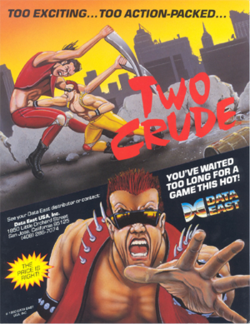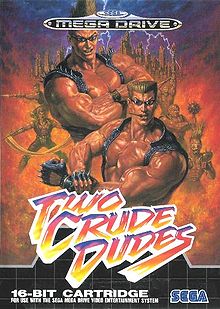- Two Crude
-
Two Crude Dudes 
North American arcade flyer of the arcade version.Developer(s) Data East Publisher(s) Data East Platform(s) Arcade
Sega Mega DriveRelease date(s) Genre(s) Beat 'em up, platform Mode(s) Single-player, two-player Media/distribution Cartridge Two Crude, known in Japan as Crude Buster (クルードバスター), is a 1991 beat 'em up arcade game produced by Data East. The game was later ported by Data East to the Sega Mega Drive in 1992 in Japan the same name as the Japanese arcade version, and later released outside of Japan as Two Crude Dudes.
Contents
Plot
The year is 20XX. A nuclear weapon combined with chemicals made by a mad scientist explodes in the city of New York, turning many of the city's inhabitants into savage mutants willing to obey any command. The scientist establishes an organization he calls "Big Valley," consisting of these mutants and many advanced military weapons. He orders them to take the ruined city by force and refuse to let anyone enter. Desperate, the US government hires the help of two super-powered mercenaries to enter the city and eliminate the villains occupying it.
Gameplay
Players control the Two Crude Dudes (individually) by jumping, dodging and attacking their way through legions of enemies. Because the main characters are muscle-bound brawlers, they have the ability to pick up objects well beyond their own weight (e.g. cars and traffic lights) to use as weapons. While playing co-op, it is also possible for one player to pick up the other to use as a projectile. Players heal in real time by punching vending machines filled with "Power Cola," causing consumable soda cans to fall out.
The game was later ported to the Genesis/Mega Drive; however, the North American and European versions of them were later retitled as Two Crude Dudes. The Japanese version of this port kept the Japanese arcade version's title unchanged.
The arcade version was later included in the compilation disc Data East Arcade Classics, along with other Data East arcade games bought by G-Mode after Data East's bankruptcy.
External links
- Official G-Mode webpage of Two Crude Dudes
- Two Crude at MobyGames
- MAWS
- Two Crude at the Killer List of Videogames
- Two Crude at the Killer List of Videogames
- Two Crude at arcade-history
- Crude Buster at arcade-history
This beat 'em up video game article is a stub. You can help Wikipedia by expanding it.

